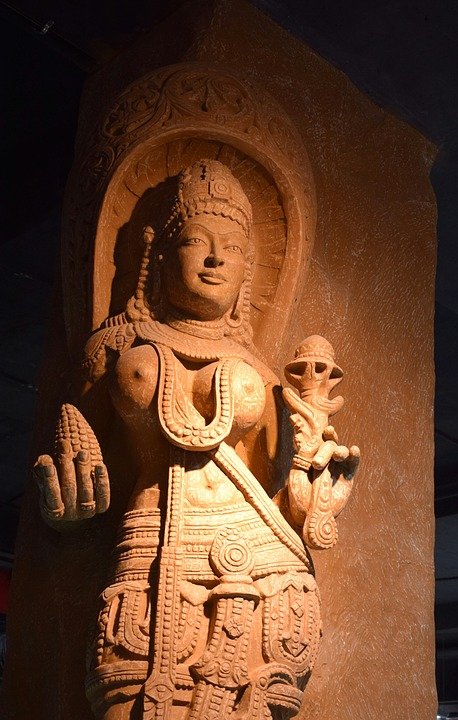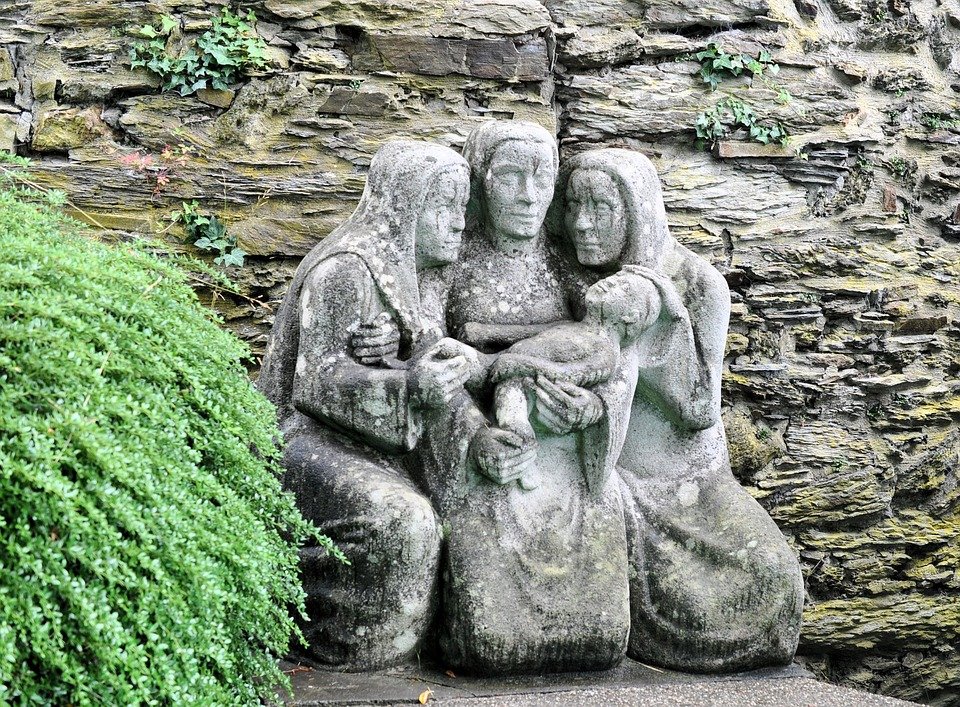Well, now. I have stumbled on some interesting research for this one. This is the ecoTrain question of the week and is a follow up to our question about patriarchy. This was harder than answering what patriarchy is. I think that is mostly the case because we live in a patriarchy. You can sort of feel your way through the question.
Not surprisingly there is a shitload of dissent about what a matriarchy is and whether or not one has ever actually existed. Ill give you the brief overview of the rabbithole i fell in yesterday and today.

In the late 19th century, there were some prehistoric artifacts discovered that sort of started to shake things up, namely art that seemed to revere women, particularly for the magical power of their bodies in birthing children. That was used to make a few assumptions and further some agendas. Some used it to say that patriarchy was an evolution from matriarchy. I know. Charming, right? Some used it to say that women should only be revered for birthing children and are only meant for this task. Also charming. All the same, this idea that prehistoric societies were in some way matriarchal continued to be taught in anthropology classes. Somewhere along about the 1970's, women, initially primarily women discovering goddess worship, began using this knowledge as a tool of empowerment. Round about this time a lot of archaeologists and anthropologists started coming forward dismissing this idea of prehistoric matriarchies. The absence of any written records from these civilizations means making inferences is both necessary and very difficult. It is clear from the art that women were revered. Whether they had power within familial and political structures is a lot harder to determine. Further discoveries seemed to indicate that the societies were actually relatively egalitarian and perhaps matrilocal, meaning families lived with the mother's family or matrilineal, meaning names and/or property passed through the women of the family.

There are a few societies that we can look at now where there was something like this happening well into recorded history, in some cases even to the present. These include indigenous cultures from the US, India, and Papua New Guinea. There are a number of different manifestations. In some cases the women and children all live together with men visiting. In others, when a couple marries, they go to live with the wife's family. Property may pass from a woman to her children or from a woman to her brother's children. In some cases, men are political leaders, but they are chosen by women. Certainly in no case does it ever look like women totally ruling over men.
And here's why: I don't think that's even possible. The idea that a matriarchy would be the opposite of a patriarchy may seem reasonable on the surface, but I would call that a patriarchy run by women. Ruling over and dominating is simply not a feminine trait. If you recall my patriarchy article, I defined patriarchy as rule through toxic masculinity. I noted that women like Hillary Clinton are totally a part of the patriarchal paradigm. So here we are back to the beginning. What in the world is matriarchy?

Because I don't see it's strict definition as even possible, I think we have to either scrap it as a word or redefine it. Matrilineal and matrilocal are a lot more specific. What would rule by women really mean? My favorite answer that I found was that it would be based on a culture of mothering, and that mothering ideal would be based on the perfect mother: Mother Earth. Here's the definition from a gemstone of a human I found yesterday, a German researcher named Heidi Gottner Abendroth. Below is her stunningly beautiful definition of a matriarchy:
"Matriarchies are not just a reversal of patriarchy, with women ruling over men - as the usual misinterpretation would have it.
"Matriarchies are mother-centered societies, they are based on maternal values: care-taking, nurturing, motherliness, which holds for everybody: for mothers and those who are not mothers, for women and men alike.
"Matriarchal societies are consciously built upon these maternal values and motherly work, and this is why they are much more realistic than patriarchies. They are, on principle, need-oriented. Their precepts aim to meet everyone’s needs with the greatest benefit. So, in matriarchies, mothering – which originates as a biological fact – is transformed into a cultural model."

There isn't really much controversy on the structure of the societies, simply whether or not it was a matriarchy. I love that it is very inclusive. This is really important to me because I am passionate about a model that includes everyone, Cis/Trans, Heterosexual/Homosexual, or male/female. It simply defines the worldview of how a society is structured, whether male or female or neither and children or no children. Equality in this structure honors and respects differences and sees the value in each. The matriarchal society seeks balance between men and women, adults and children, humans and the earth. In fact she explains this inclusiveness a step further in the following quote:
"But in matriarchies, you don’t have to be a biological mother in order to be acknowledged as a woman, because matriarchies practice the common motherhood of a group of sisters. Each individual sister does not necessarily have to have children, but together they are all “mothers” of any children that any of them have. This motherhood is founded on the freedom of women to decide on their own about whether or not to have biological children."

Part of her mission is actually to move society in the direction of this vision of a matriarchal society. I suspect that is part of why she talks about it in the present tense. You can read more about it here I haven't read it all the way through, but it is exceptionally beautiful. She's interested in moving it in that direction without making it entirely like the matriarchal societies of the past. I'll talk more about it in the next post about an ideal society.
Essentially women lived together in a clan with their mothers, grandmothers, maternal uncles, great uncles, and brothers. Men in some cases simply came to visit. Economically, the clan mother ensured that everyone was cared for. There was no concept of land ownership. When there was abundance, the clan would share with other clans through festivals and gifts. Politically, the clans would decide together their own structure, as well as their stance on any decisions that needed to be made with other villages. Negotiations happened until everyone was in agreement.
Some years ago, I was blessed to become part of a community that practiced Native American spiritual ceremonies. I can't tell you how many times I sat in a sweat lodge on my knees praying and crying for the wisdom to be the kind of mother that Mother Earth is, not just toward my children but toward all of my family and community, always giving without expectation, always loving without condition, yet always clear and firm in her boundaries. Coming across this body of work and imagining a whole society based on this wisdom is actually life changing for me. I haven't wanted to dig into something this deeply in a long, long time.

Is it really matriarchy? I don't know. I don't really care. Perhaps an actual matriarchy where women control all aspects of society and rule over men and children would look like a bad mother. In any case, anything to the extreme is going to be shitty. Personally, I like this definition better. I like the idea of the rule of the mother, and I think it gives us a really good starting point and framework for creating a new structure for society.
In the final post I will pick apart the pieces of this philosophy and others to put together the balance that I think is perfect.
